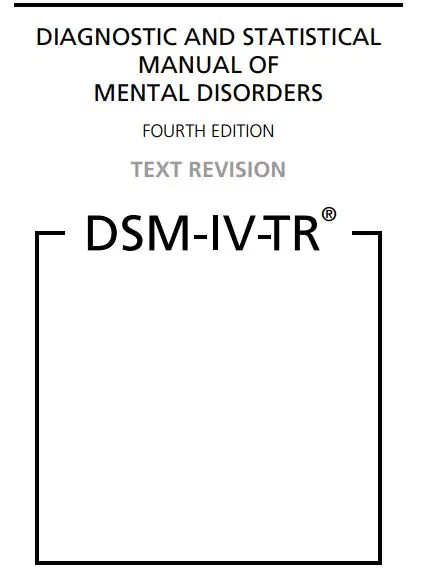‘DSM-IV By American Psychiatric Association’ PDF Quick download link is given at the bottom of this article. You can see the PDF demo, size of the PDF, page numbers, and direct download Free PDF of ‘DSM-IV-TR’ using the download button.
Diagnostic And Statistical Manual Of Mental Disorders PDF Free Download

Dsm
Acknowledgments for DSM-IV
DSM-IV was a team effort. More than 1,000 people (and numerous professional organizations) have helped us in the preparation of this document.
Members of the Task Force on DSM-IV and DSM-IV Staff are listed on p. xi, members of the DSM-IV Work Groups are listed on pp. xii–xiv, and a list of other participants is included in Appendix J.
The major responsibility for the content of DSM-IV rests with the Task Force on DSM-IV and members of the DSM-IV Work Groups.
They have worked (often much harder than they bargained for) with dedication and good cheer that has been inspirational to us.
Bob Spitzer has our special thanks for his untiring efforts and unique perspective.
Norman Sartorius, Darrel Regier, Lewis Judd, Fred Goodwin, and Chuck Kaelber were instrumental in facilitating a mutually productive interchange between the American Psychiatric Association and the World Health Organization that has improved both DSM-IV and ICD-10 and increased their compatibility.
We are grateful to Robert Israel, Sue Meads, and Amy Blum at the National Center for Health Statistics and Andrea Albaum-Feinstein at the American Health Information Management Association for suggestions on the DSM-IV coding system.
Denis Prager, Peter Nathan, and David Kupfer helped us to develop a novel data reanalysis strategy that has been supported with funding from the John D. and Catherine T. MacArthur Foundation.
Many individuals within the American Psychiatric Association deserve recognition. Mel Sabshin’s special wisdom and grace made even the most tedious tasks seem worth doing.
The American Psychiatric Association Committee on Psychiatric Diagnosis and Assessment (chaired by Layton McCurdy) provided valuable direction and counsel.
We would also like to thank the American Psychiatric Association Presidents (Drs. Fink, Pardes, Benedek, Hartmann, English, and McIntyre) and Assembly (Drs. Cohen, Flamm, Hanin, Pfaehler, and Shellow) who helped with the planning of our work.
Carolyn Robinowitz and Jack White, and their respective staffs in the American Psychiatric Association Medical Director’s Office and the Business Administration Office, have provided valuable assistance in the organization of the project.
Several other individuals have our special gratitude. Wendy Davis, Nancy Vettorello, and Nancy Sydnor-Greenberg developed and implemented an organizational structure that has kept this complex project from spinning out of control.
We have also been blessed with an unusually able administrative staff, which has included Elisabeth Fitzhugh, Willa Hall, Kelly McKinney, Gloria Miele, Helen Stayna, Sarah Tilly, Nina Rosenthal, Susan Mann, Joanne Mas, and, especially, Cindy Jones.
Ruth Ross, our tireless Science Editor, has been responsible for improving the clarity of expression and organization of DSM-IV.
Myriam Kline (Research Coordinator for the NIH-funded DSM-IV Focused Field Trials), Jim Thompson (Research Coordinator).
The effort to revise the DSM-IV text was also a team effort.
We are especially indebted to the tireless efforts of the DSM-IV Text Revision Work Groups (listed on pp. xv–xvii), who did the lion’s share of the work in the preparation of this revision.
Historical Background
The need for a classification of mental disorders has been clear throughout the history of medicine, but there has been little agreement on which disorders should be included and the optimal method for their organization.
The many nomenclatures that have been developed during the past two millennia have differed in their relative emphasis on phenomenology, etiology, and course as defining features.
Some systems have included only a handful of diagnostic categories; others have included thousands.
Moreover, the various systems for categorizing mental disorders have differed with respect to whether their principle objective was for use in clinical, research, or statistical settings.
| Author | – |
| Language | English |
| No. of Pages | 982 |
| PDF Size | 7.4 MB |
| Category | Health |
| Source/Credits | zero.sci-hub |
DSM-IV-TR: Diagnostic And Statistical Manual Of Mental Disorders PDF Free Download
